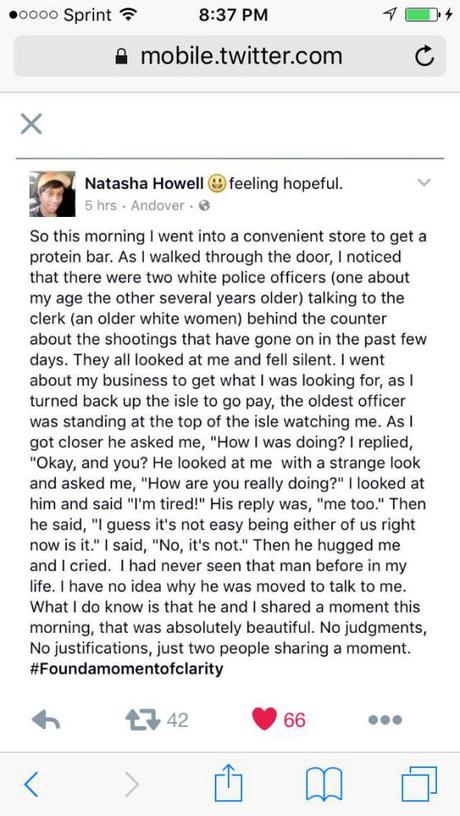The headlines chase us down, taunting us with their urgency, telling us to how to respond. They never stop. We may sleep, but the headlines don't.
And they don't want us to - not really. The person who is first to share or tweet a story gets the prize.
Behind the bad headlines are some poignant stories of reconciliation and redemption. They don't get attention, but they should. Condemnation is newsworthy. Redemption is not. Miscommunication is newsworthy. Communicating across boundaries and finding a point of connection is not. Hate is newsworthy. Love is not.
Today I want to remind us of three good stories that are pushed under bad headlines. They are not all recent, but they are newsworthy all the same.The first comes from a picture that I first saw on social media. In her own words, a woman describes how a stranger, a police officer, gave her a moment of hope. I've included the picture here, because it's best in her words.

The second story comes from a few years ago when Chick-fil-A dominated the headlines. People were being urged to boycott the company because the chief operating officer, Dan Cathy, had made some public comments against same sex marriage. For a week, this fed the news. Anger and hatred on both sides erupted. Chick-fil-a was branded, forever it seemed. What people don't know is what happened later.
While the U.S. was embroiled in the controversy, Dan Cathy telephoned the founder and executive director of Campus Pride, the group that launched a multi-million dollar campaign against Chick-fil-A, Shane Windmeyer. This was the first of what would be many phone calls and meetings between these two followed by other executives of Chick-fil-A. It resulted in an unlikely, but amazing, friendship between Dan Cathy and Shane Windmeyer. In Windmeyer's own words:
"Through all this, Dan and I shared respectful, enduring communication and built trust. His demeanor has always been one of kindness and openness. Even when I continued to directly question his public actions and the funding decisions, Dan embraced the opportunity to have dialogue and hear my perspective. He and I were committed to a better understanding of one another. Our mutual hope was to find common ground if possible, and to build respect no matter what. We learned about each other as people with opposing views, not as opposing people.......I will not change my views, and Dan will likely not change his, but we can continue to listen, learn and appreciate "the blessing of growth" that happens when we know each other better. I hope that our nation's political leaders and campus leaders might do the same."It is an amazing story of friendship, forged despite deep differences in beliefs. It's a story of hope behind a headline that breeded controversy across social media.
The third story comes a Christian college, and headlines that painted the college as Islamophobic. The headlines were based on an incident where a professor at the college donned hijab to identify with Muslims. The administration of the college reacted and the professor and Wheaton College "parted ways." I have my own opinion of this college professor deciding to don a hijab, but that's not what this article is about. The headlines of the Chicago Tribune are loud and clear: Wheaton College demonstrators launch fast to spotlight Islamophobia.
The story behind the scenes looks quite different. Months before the incident, Wheaton College students and professors were meeting with Muslim leaders in the area. They were forming friendships and having dialogue with Muslims, seeking to better understand each other.
A Wheaton professor writes an outstanding article about this in the magazine First Things:
"I will admit to losing hope that the media can hear any of this. My colleague Noah Toly and I related nearly all of these facts to a reporter who, to our absolute bafflement, could still not shake the assumption that we were "Islamophobic." But it really doesn't matter if we're misunderstood. We will keep engaging our Muslim neighbors, because we're not just meeting with them in order to be recognized for doing so. We're doing so because we believe in the God who does not just have love-but in the community of Father, Son and Holy Spirit-he is love. We believe one person of that Trinity, Jesus, took on human flesh, was crucified and rose from the dead. And in the mystery of his risen life he is with those who are maligned and marginalized and misunderstood-and so we see our Lord Jesus in the faces of our Muslim neighbors. To hate you, therefore, would be to hate him."So, what do these three stories tell me? What should they tell all of us?
Perhaps we need to step back before we react. Perhaps we need to give the headlines some time, so that other stories can emerge. Stories that defy the headlines and give us some hope.

